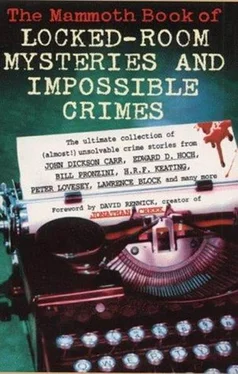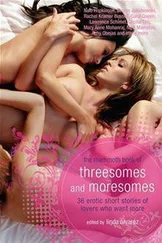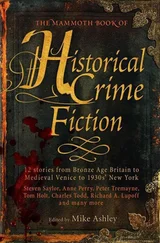Mike Ashley - The Mammoth Book of Locked-Room Mysteries And Impossible Crimes
Здесь есть возможность читать онлайн «Mike Ashley - The Mammoth Book of Locked-Room Mysteries And Impossible Crimes» весь текст электронной книги совершенно бесплатно (целиком полную версию без сокращений). В некоторых случаях можно слушать аудио, скачать через торрент в формате fb2 и присутствует краткое содержание. Жанр: Детектив, на английском языке. Описание произведения, (предисловие) а так же отзывы посетителей доступны на портале библиотеки ЛибКат.
- Название:The Mammoth Book of Locked-Room Mysteries And Impossible Crimes
- Автор:
- Жанр:
- Год:неизвестен
- ISBN:нет данных
- Рейтинг книги:3 / 5. Голосов: 1
-
Избранное:Добавить в избранное
- Отзывы:
-
Ваша оценка:
- 60
- 1
- 2
- 3
- 4
- 5
The Mammoth Book of Locked-Room Mysteries And Impossible Crimes: краткое содержание, описание и аннотация
Предлагаем к чтению аннотацию, описание, краткое содержание или предисловие (зависит от того, что написал сам автор книги «The Mammoth Book of Locked-Room Mysteries And Impossible Crimes»). Если вы не нашли необходимую информацию о книге — напишите в комментариях, мы постараемся отыскать её.
A new anthology of twenty-nine short stories features an array of baffling locked-room mysteries by Michael Collins, Bill Pronzini, Susanna Gregory, H. R. F. Keating, Peter Lovesey, Kate Ellis, and Lawrence Block, among others.
The Mammoth Book of Locked-Room Mysteries And Impossible Crimes — читать онлайн бесплатно полную книгу (весь текст) целиком
Ниже представлен текст книги, разбитый по страницам. Система сохранения места последней прочитанной страницы, позволяет с удобством читать онлайн бесплатно книгу «The Mammoth Book of Locked-Room Mysteries And Impossible Crimes», без необходимости каждый раз заново искать на чём Вы остановились. Поставьте закладку, и сможете в любой момент перейти на страницу, на которой закончили чтение.
Интервал:
Закладка:
Graf Maximilian dug up what remained of the family fortune from behind the stable, where his father had buried it in 1939 as the Nazis closed in. It consisted of some very valuable jewellery, the tangible result of four centuries of oppressing the serfs; some silver plate used to entertain fellow nobles and royalty when they dropped by; some papers proving the family title to a sizable chunk of southern Poland that the Polish government was not about to give back; and the St Simon. He had immediately taken his family and his heirlooms back to Paris, where he had folded the act, sold the horses and a bit of the jewellery and had the St Simon authenticated.
The image of St Simon stoning the children was painted on a thin cedar board about 86 centimetres high and 62 centimetres wide. Which, for the metrically challenged, is about two feet by three feet. The art experts had decided that it had been painted in Germany in the fourteenth century, probably one panel of a polyptych that formed the altarpiece in a church of St Simon. A painting that might very well be another panel of the polyptych hung in the Valletta art museum on Malta.
The police report told as implausible a story of grand theft as ever I have read. The Czeppskis’ apartment was on the eighth floor of a brand new high-rise building at the intersection of Wilshire and Brass, just west of Beverly Hills. All expensive, all elegant, and not at all where I would choose to live in the midst of a major earthquake fault zone. They had left their apartment early evening last night, except for daughter Paula, who didn’t leave until a little after eleven. None of them was wearing or carrying anything that could have concealed a two-by-three foot inflexible cedar board. According to the concierge on duty, and I could just picture his grin when he said it, the way Paula was dressed she would have had trouble concealing a toothbrush.
The painting had been there shortly before they left – several reputable citizens had been over for cocktails and could testify to that. It had not been there when Graf and Grafin Czeppski returned from what the reporting officer had written down as “a benefit for indignant actors” at about two in the morning. The only ways downstairs from the Czeppskis’ apartment were by the elevator, which wouldn’t stop at any floor between the resident’s and the lobby, and a staircase which you could enter at any floor but only leave at the lobby floor. There were security cameras in the elevator and at every landing in the staircase. The staff claimed to have seen nothing unusual between when the Czeppskis left and when they returned, and a check of the security camera tapes backed them up on that.
I could see why Fid Mut was suspicious. I had no opinion yet. I hoped to form one within the next few hours.
The doorman admitted me to the lobby, the concierge called upstairs to make sure I was a welcome guest, and then a lobby man walked me to the elevator and punched 8 for me, in case I had forgotten how. He used a key to activate the panel, and then removed it; so even if I had wanted to get off at another floor, the elevator wouldn’t have stopped.
Graf Czeppski met me at the door. A tall man with rounded corners wearing a brown suit, a white, button-down shirt with vertical green stripes, and a forest-green tie as wide as his smile, he shook my hand with a hardy, vice-like grip. I managed to pull the hand free before any of the larger bones were broken, and returned his smile.
“You are agent Stanley Baum,” he said, “of the insurance company?”
“Yes, sir,” I agreed. Not exactly right, but close enough for jazz, as we used to say. I wondered whether I was supposed to call him “your excellency,” or “your highness,” or something, but then decided not to worry about it. We are all equal here in the Land of the Free, although some are more equal than others. But such inequalities as exist are seldom based on previous patents of nobility.
“Come quite in,” he invited. “Look over the house. Question the servitors. This thing is surely a mystery. We are anxious for it to have a solution.”
“I’ll see what I can do,” I told him.
He showed me into the living room. It was a study in chiaroscuro. The walls and drapes were white, the wall-to-wall carpet was black. The drapes which covered the wide picture window hung from a thick black rod and were accented with black cords. There was a long black couch in the shape of an L framing the centre of the room, a large, low black table in front of it, and an easy chair of the same pattern as the couch across from it. They looked modern, but the other pieces in the room – several severe-looking straight-back white chairs, an armoire, and a small desk that had been done in a black stain so that the wood grain showed through – all looked to be of an older European pattern. They might well have been antiques.
His wife and daughter were there, but there wasn’t a servitor in evidence. The wife, sitting on one of the straight-back chairs, was thin of body and lip, with a sharp nose. She blended in with the chiaroscuro motif; wearing a straight-line black dress with a touch of white lace around the narrow collar, and had a single strand of pearls the size of walnuts around her neck and a ring with a diamond the size of a major metropolitan area on the ring finger of her right hand. She seemed distinctly annoyed at having to speak to me. I couldn’t tell whether it was because I was a detective or because the lapels on my jacket were too narrow.
The daughter, sitting on the couch at the short end of the L, was the woman I had been dreaming about at least once a week since I was seventeen. I won’t tell you what sort of dreams they were, but I imagine you can guess. A blue-eyed blonde with sharply chiselled features, she was wearing charcoal grey slacks and a white shirt with the sleeves rolled up, and had that air of quiet elegance that looks so natural and is so difficult and expensive to acquire. She had a lithe, slender, athletic-looking body, and looked to be somewhere around thirty, but I could have been off by a decade in either direction; I’m very bad at guessing women’s ages. I’m not much better with men, but I seldom find myself wondering about a man’s age.
The graf introduced me and I settled on the corner of the couch away from the daughter, as the chairs looked too fragile to hold me, and pulled out my pocket notebook. Not that I needed it, my memory is trained and practiced, but it gave me that air of authority that I otherwise lack. “If you could tell me what happened,” I said to the room at large.
“We’ve told all that already,” Grafin Sylvia said, staring down the edge of her nose at me. “To the police and to that other insurance person. I don’t see any need to repeat it for a third time.” She was perched on a delicate-looking chair of blackened wood with a white cushioned seat.
Paula shifted in her seat. “In my opinion -” she began.
Grafin Sylvia swivelled to look at her and snapped, “We don’t need your opinion!”
Paula’s face flushed a deep red, and she took several deep breaths, but then she calmed down and nothing more came of it. A pity. Perhaps later I could take her aside and ask her what she had been going to say.
I stood up, stuck the notebook in my jacket pocket, and buttoned the jacket. “I’m terribly sorry to have bothered you,” I said. “I was told that you were anxious to get your cheque for the painting. I’ll find my own way out.”
“Now, now,” the graf said, with a broad smile on his face, intercepting me on the way to the door. “You’ll have to excuse my wife. She is extremely troubled about all this. It has upset her terribly.” He glared at his wife and snapped a few words to her in what I assume was Polish.
Читать дальшеИнтервал:
Закладка:
Похожие книги на «The Mammoth Book of Locked-Room Mysteries And Impossible Crimes»
Представляем Вашему вниманию похожие книги на «The Mammoth Book of Locked-Room Mysteries And Impossible Crimes» списком для выбора. Мы отобрали схожую по названию и смыслу литературу в надежде предоставить читателям больше вариантов отыскать новые, интересные, ещё непрочитанные произведения.
Обсуждение, отзывы о книге «The Mammoth Book of Locked-Room Mysteries And Impossible Crimes» и просто собственные мнения читателей. Оставьте ваши комментарии, напишите, что Вы думаете о произведении, его смысле или главных героях. Укажите что конкретно понравилось, а что нет, и почему Вы так считаете.










